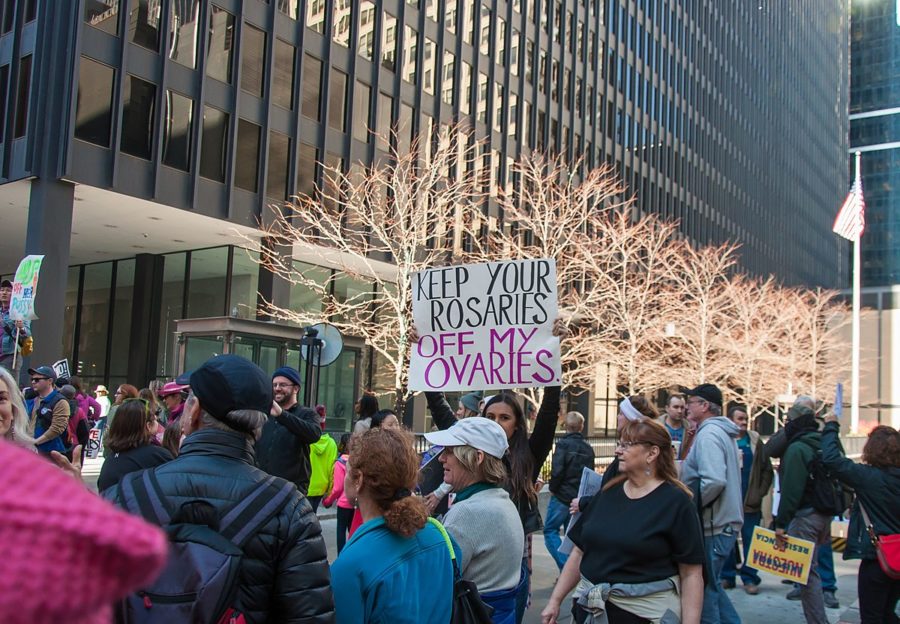Abortion Bans Violate the Separation of Church and State
Photo courtesy of bradhoc on Flickr
The Women’s March in Chicago with people holding up a sign that says “keep your rosaries off my ovaries”
March 23, 2023
9 months ago, the Supreme Court overturned 50 years of abortion precedent with the case Dobbs v. Jackson Women’s Health Organization, which ruled that abortion is not a constitutional right and overruled Roe v. Wade and Planned Parenthood v. Casey.
Since then, some states have ratified their states constitutions to protect the right to abortion in their states. However, in some states like Florida and Texas, abortion has been banned statewide. Across the country, tensions have been on the rise between abortion-rights and anti-abortion organizations following the ruling and subsequent state-level initiatives.
But what is the basis of anti-abortion groups who want to block abortions in all states? Religion and philosophy. They argue that a fetus is a life and deserves the rights a person would have, and that “God wouldn’t kill an innocent life.” This very argument introduces the question, what is a life? When does life begin? Is it contraception? Or is it when the fetus is out of the womb?
Quite frankly, it shouldn’t matter. Abortion should not be a debate of when life begins. It should not be a debate of what god says. It is an issue of medical decisions and who has the right to make a personal medical decision. It is an issue of citizen privacy vs government overreach. The bible is not this country’s constitution. If we started making legislation solely based on what the bible says is acceptable and unacceptable, the majority of our lawmakers would not be in office.
There are plenty of American customs and laws that go directly against the bible and the church’s word, and no one bats an eye. The bible prohibits divorce, wearing braids, tattoos, mixed-fiber fabrics, lying, some shellfish, and gossiping, for example. The US divorce rate is 50%, most people have had a braid in their hair at some point. Around 45 million people in the US have a tattoo. 69% of all clothing is made of mixed fiber fabrics. Everyone has told a white lie. Maryland itself is the national supplier of crabs and clams. And don’t tell me you don’t gossip, because that would be a lie (remember, that’s also against the bible).
We simply do not have precedent for prohibiting something based on a religious reason. We don’t ban alcohol just because our Muslim and Amish citizens don’t believe in drinking it. We don’t ban dating and premarital sex because our Catholic and Mormon citizens don’t believe in it. Abortion should be no different. Religious anti-abortion activists have no grounds for an argument against abortion because we have separation of church and state outlined in the constitution.
Furthermore, anti-abortion laws violate some tenets of Judaism, which widely considers life to begin at birth, and Islam, which generally considers life to begin at 120 days into a pregnancy, but almost always allows for abortion in the case of serious threat to a pregnant person’s wellbeing. Of course, within each community, there are a variety of opinions surrounding abortion, just as there are in Christian communities. There are other religions and perspectives in this country that we have to respect, so legislatures should not make decisions based on anti-abortion Christian beliefs. When an argument is based on an incorrect premise—that everyone practices the same faith the same way—that argument cannot be logically sound, and displays the arrogance of its proponent. It is unconstitutional for state legislators to consider only one religion when making law.
Conservative Christians do not have to like or even approve of abortion, but trying arguing against the procedure with God as their backup is not a valid argument. Forcing pregnant people to carry to term because it’s what God would want is a laughable argument, especially for those who don’t even believe in God.
Abortion is a medical procedure that should be between a patient and a doctor. It should not be between the government and the church.

Jessica Pagi • Mar 24, 2023 at 9:49 am
Great perspective and points, Phia! Besos!!
Nicole Willey • Mar 23, 2023 at 3:17 pm
This article is amazing and so are you Sophia!!!